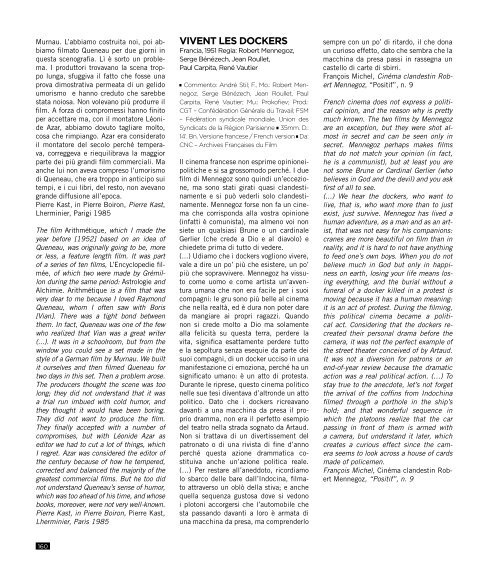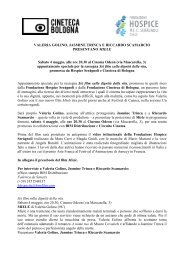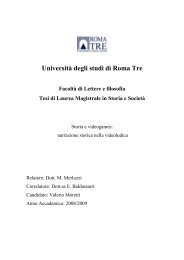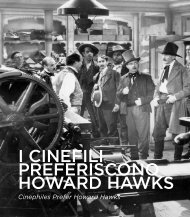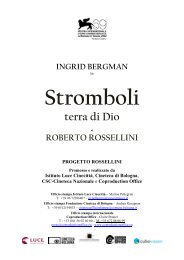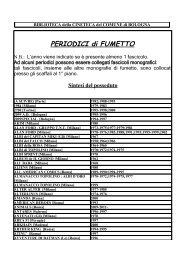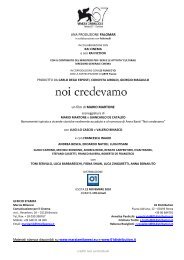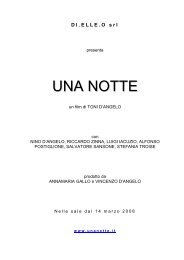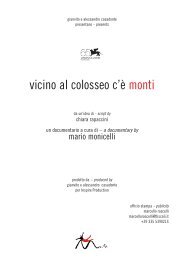Ritrovati & Restaurati sonori.pdf - Cineteca di Bologna
Ritrovati & Restaurati sonori.pdf - Cineteca di Bologna
Ritrovati & Restaurati sonori.pdf - Cineteca di Bologna
You also want an ePaper? Increase the reach of your titles
YUMPU automatically turns print PDFs into web optimized ePapers that Google loves.
Murnau. L’abbiamo costruita noi, poi abbiamo<br />
filmato Queneau per due giorni in<br />
questa scenografia. Lì è sorto un problema.<br />
I produttori trovavano la scena troppo<br />
lunga, sfuggiva il fatto che fosse una<br />
prova <strong>di</strong>mostrativa permeata <strong>di</strong> un gelido<br />
umorismo e hanno creduto che sarebbe<br />
stata noiosa. Non volevano più produrre il<br />
film. A forza <strong>di</strong> compromessi hanno finito<br />
per accettare ma, con il montatore Léonide<br />
Azar, abbiamo dovuto tagliare molto,<br />
cosa che rimpiango. Azar era considerato<br />
il montatore del secolo perché temperava,<br />
correggeva e riequilibrava la maggior<br />
parte dei più gran<strong>di</strong> film commerciali. Ma<br />
anche lui non aveva compreso l’umorismo<br />
<strong>di</strong> Queneau, che era troppo in anticipo sui<br />
tempi, e i cui libri, del resto, non avevano<br />
grande <strong>di</strong>ffusione all’epoca.<br />
Pierre Kast, in Pierre Boiron, Pierre Kast,<br />
Lherminier, Parigi 1985<br />
The film Arithmétique, which I made the<br />
year before [1952] based on an idea of<br />
Queneau, was originally going to be, more<br />
or less, a feature length film. It was part<br />
of a series of ten films, L’Encyclope<strong>di</strong>e filmée,<br />
of which two were made by Grémillon<br />
during the same period: Astrologie and<br />
Alchimie. Arithmétique is a film that was<br />
very dear to me because I loved Raymond<br />
Queneau, whom I often saw with Boris<br />
[Vian]. There was a tight bond between<br />
them. In fact, Queneau was one of the few<br />
who realized that Vian was a great writer<br />
(...). It was in a schoolroom, but from the<br />
window you could see a set made in the<br />
style of a German film by Murnau. We built<br />
it ourselves and then filmed Queneau for<br />
two days in this set. Then a problem arose.<br />
The producers thought the scene was too<br />
long; they <strong>di</strong>d not understand that it was<br />
a trial run imbued with cold humor, and<br />
they thought it would have been boring.<br />
They <strong>di</strong>d not want to produce the film.<br />
They finally accepted with a number of<br />
compromises, but with Léonide Azar as<br />
e<strong>di</strong>tor we had to cut a lot of things, which<br />
I regret. Azar was considered the e<strong>di</strong>tor of<br />
the century because of how he tempered,<br />
corrected and balanced the majority of the<br />
greatest commercial films. But he too <strong>di</strong>d<br />
not understand Queneau’s sense of humor,<br />
which was too ahead of his time, and whose<br />
books, moreover, were not very well-known.<br />
Pierre Kast, in Pierre Boiron, Pierre Kast,<br />
Lherminier, Paris 1985<br />
160<br />
VIVENT LES DOCKERS<br />
Francia, 1951 Regia: Robert Mennegoz,<br />
Serge Bénézech, Jean Roullet,<br />
Paul Carpita, René Vautier<br />
█ Commento: André Stil; F., Mo.: Robert Mennegoz,<br />
Serge Bénézech, Jean Roullet, Paul<br />
Carpita, René Vautier; Mu.: Prokofiev; Prod.:<br />
CGT – Confédération Générale du Travail; FSM<br />
– Fédération syn<strong>di</strong>cale mon<strong>di</strong>ale, Union des<br />
Syn<strong>di</strong>cats de la Région Parisienne █ 35mm. D.:<br />
14’. Bn. Versione francese / French version █ Da:<br />
CNC – Archives Françaises du Film<br />
Il cinema francese non esprime opinioneipolitiche<br />
e si sa grossomodo perché. I due<br />
film <strong>di</strong> Mennegoz sono quin<strong>di</strong> un’eccezione,<br />
ma sono stati girati quasi clandestinamente<br />
e si può vederli solo clandestinamente.<br />
Mennegoz forse non fa un cinema<br />
che corrisponda alla vostra opinione<br />
(infatti è comunista), ma almeno voi non<br />
siete un qualsiasi Brune o un car<strong>di</strong>nale<br />
Gerlier (che crede a Dio e al <strong>di</strong>avolo) e<br />
chiedete prima <strong>di</strong> tutto <strong>di</strong> vedere.<br />
(...) U<strong>di</strong>amo che i dockers vogliono vivere,<br />
vale a <strong>di</strong>re un po’ più che esistere, un po’<br />
più che sopravvivere. Mennegoz ha vissuto<br />
come uomo e come artista un’avventura<br />
umana che non era facile per i suoi<br />
compagni: le gru sono più belle al cinema<br />
che nella realtà, ed è dura non poter dare<br />
da mangiare ai propri ragazzi. Quando<br />
non si crede molto a Dio ma solamente<br />
alla felicità su questa terra, perdere la<br />
vita, significa esattamente perdere tutto<br />
e la sepoltura senza esequie da parte dei<br />
suoi compagni, <strong>di</strong> un docker ucciso in una<br />
manifestazione ci emoziona, perché ha un<br />
significato umano: è un atto <strong>di</strong> protesta.<br />
Durante le riprese, questo cinema politico<br />
nelle sue tesi <strong>di</strong>ventava d’altronde un atto<br />
politico. Dato che i dockers ricreavano<br />
davanti a una macchina da presa il proprio<br />
dramma, non era il perfetto esempio<br />
del teatro nella strada sognato da Artaud.<br />
Non si trattava <strong>di</strong> un <strong>di</strong>vertissement del<br />
patronato o <strong>di</strong> una rivista <strong>di</strong> fine d’anno<br />
perché questa azione drammatica costituiva<br />
anche un’azione politica reale.<br />
(…) Per restare all’aneddoto, ricor<strong>di</strong>amo<br />
lo sbarco delle bare dall’Indocina, filmato<br />
attraverso un oblò della stiva; e anche<br />
quella sequenza gustosa dove si vedono<br />
i plotoni accorgersi che l’automobile che<br />
sta passando davanti a loro è armata <strong>di</strong><br />
una macchina da presa, ma comprenderlo<br />
sempre con un po’ <strong>di</strong> ritardo, il che dona<br />
un curioso effetto, dato che sembra che la<br />
macchina da presa passi in rassegna un<br />
castello <strong>di</strong> carte <strong>di</strong> sbirri.<br />
François Michel, Cinéma clandestin Robert<br />
Mennegoz, “Positif”, n. 9<br />
French cinema does not express a political<br />
opinion, and the reason why is pretty<br />
much known. The two films by Mennegoz<br />
are an exception, but they were shot almost<br />
in secret and can be seen only in<br />
secret. Mennegoz perhaps makes films<br />
that do not match your opinion (in fact,<br />
he is a communist), but at least you are<br />
not some Brune or Car<strong>di</strong>nal Gerlier (who<br />
believes in God and the devil) and you ask<br />
first of all to see.<br />
(...) We hear the dockers, who want to<br />
live, that is, who want more than to just<br />
exist, just survive. Mennegoz has lived a<br />
human adventure, as a man and as an artist,<br />
that was not easy for his companions:<br />
cranes are more beautiful on film than in<br />
reality, and it is hard to not have anything<br />
to feed one’s own boys. When you do not<br />
believe much in God but only in happiness<br />
on earth, losing your life means losing<br />
everything, and the burial without a<br />
funeral of a docker killed in a protest is<br />
moving because it has a human meaning:<br />
it is an act of protest. During the filming,<br />
this political cinema became a political<br />
act. Considering that the dockers recreated<br />
their personal drama before the<br />
camera, it was not the perfect example of<br />
the street theater conceived of by Artaud.<br />
It was not a <strong>di</strong>version for patrons or an<br />
end-of-year review because the dramatic<br />
action was a real political action. (…) To<br />
stay true to the anecdote, let’s not forget<br />
the arrival of the coffins from Indochina<br />
filmed through a porthole in the ship’s<br />
hold; and that wonderful sequence in<br />
which the platoons realize that the car<br />
passing in front of them is armed with<br />
a camera, but understand it later, which<br />
creates a curious effect since the camera<br />
seems to look across a house of cards<br />
made of policemen.<br />
François Michel, Cinéma clandestin Robert<br />
Mennegoz, “Positif”, n. 9


